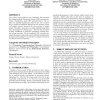Free Online Productivity Tools
i2Speak
i2Symbol
i2OCR
iTex2Img
iWeb2Print
iWeb2Shot
i2Type
iPdf2Split
iPdf2Merge
i2Bopomofo
i2Arabic
i2Style
i2Image
i2PDF
iLatex2Rtf
Sci2ools
111
Voted
ACMICEC
2008
ACM
2008
ACM
Why share in peer-to-peer networks?
Prior theory and empirical work emphasize the enormous free-riding problem facing peer-to-peer (P2P) sharing networks. Nonetheless, many P2P networks thrive. We explore two possible explanations that do not rely on altruism or explicit mechanisms imposed on the network: direct and indirect private incentives for the provision of public goods. The direct incentive is a traffic redistribution effect that advantages the sharing peer. We find this incentive is likely insufficient to motivate equilibrium content sharing in large networks. We then approach P2P networks as a graph-theoretic problem and present sufficient conditions for sharing and free-riding to co-exist due to indirect incentives we call generalized reciprocity. Categories and Subject Descriptors C.2.4 [Computer-Communication Networks]: Distributed
Related Content
| Added | 12 Oct 2010 |
| Updated | 12 Oct 2010 |
| Type | Conference |
| Year | 2008 |
| Where | ACMICEC |
| Authors | Lian Jian, Jeffrey K. MacKie-Mason |
Comments (0)

